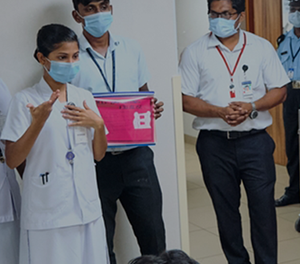TEACHING AND TRAINING PROGRAMMES IN THE DEPARTMENT OF BIOCHEMISTRY
The department is involved in teaching programs for undergraduate students. These include those in the MBBS, BSc nursing, post-basic BSc (BScNPB) nursing, and various allied health courses. The department is recognized for postgraduate training in Biochemistry (MD) (2 candidates per year) and training of PhD students.
MBBS
The MBBS teaching programme adopts a multifaceted approach to teaching that extends beyond didactic instruction. Our methodology encompasses integrated teaching of basic biochemistry and its clinical applications, fostering small group discussions, and providing tailored support programs for students who may require additional academic assistance. A notable initiative involves clinicians delivering case-based lectures pertinent to Biochemistry, fostering student engagement and correlation between theoretical concepts and clinical scenarios. These sessions are further reinforced through small group case-based discussions, facilitating the seamless integration of pre-clinical and clinical sciences.
We integrate e-learning extensively into our medical education approach. Through digital platforms, students access teaching material and self-assessment tools tailored to their curriculum, fostering flexible learning. The curriculum includes the Integrated Learning Program (ILP), in collaboration with the departments of anatomy and physiology. This immersive module involving topics related to the gastrointestinal system incorporates problem-based learning, clinical exposure, patient interactions, supplementary lectures, and laboratory exercises, enriching the educational experience. To ensure ongoing support and mentorship, students are paired with faculty mentors who oversee their academic and personal growth through structured meetings and interactions. Additionally, proactive measures are taken to assist students experiencing academic challenges, including counseling and tailored support programs to enhance their success during the initial year of the course.
Continuous improvement is a cornerstone of our educational ethos. Regular student evaluations, conducted anonymously, provide invaluable insights into teaching effectiveness and faculty performance. This feedback loop enables dynamic adjustments to the curriculum, ensuring alignment with student needs and elevating the overall quality of instruction. Notably, our department consistently receives commendable ratings in these evaluations, reflecting our commitment to excellence.
Recognizing and incentivizing academic achievement, we award two prestigious prizes in biochemistry. The S.C. Devadutta prize honors the best essay on any biochemistry topic, open to all medical students, while the Amuthur G. N. Iyer prize acknowledges the student who secures the highest marks in first-year Biochemistry. These accolades inspire scholarly pursuit and academic excellence among our students, further enriching the learning culture within our institution.
MD BIOCHEMISTRY
The postgraduate course in Biochemistry (MD Biochemistry) is aligned with the curriculum outlined by The Tamil Nadu Dr. MGR Medical University, Chennai. It is designed to equip candidates with comprehensive knowledge and expertise in various facets of the discipline.
The curriculum provides a strong foundation in the theoretical aspects of medical biochemistry and the practical operations of a diagnostic laboratory. It also provides training in pedagogy for undergraduate medical and nursing courses. Additionally, trainees have opportunities to hone their communication skills through participation in seminars and journal clubs. A pivotal component of our programme is the rigorous training in research as part of the dissertation research project.
Through structured research training, candidates undergo a progressive journey from attending institutional workshops on research methodology, writing a research proposal for submission to the Institutional Review Board (IRB), conducting research as per best practices, and finally, writing the thesis for submission to the university. Candidates also benefit from clinical rotations across diverse specialties, including General Medicine, Endocrinology, Nephrology, Gastroenterology, and Intensive Care, gaining invaluable insights into the clinical applications of biochemical principles. Complementing this clinical exposure, a foundational understanding of Biostatistics is imparted, empowering candidates with the analytical tools necessary for data interpretation and evidence-based practice.
NURSING COURSES
Nursing courses taught:
- Post basic BSc(N) program: College of Nursing, CMC, Vellore (50 students/year)
- BSc(N) program: College of Nursing, CMC, Vellore (100 students/year)
- BSc(N) program: College of nursing, CMC, Chittoor campus (50 students/year)
Teaching programme:
The teaching programme for the nursing students is aimed at:
- Highlighting the significance of biochemistry in understanding the mechanisms underlying disease development.
- Instilling in students an understanding of why specific biochemical tests are essential for diagnosing and monitoring disease conditions
- Equipping students with the essential abilities to operate simple point-of-care testing tools such as glucometers and urine dipsticks
ALLIED HEALTH SCIENCE (AHS) COURSES
Allied health professionals are an essential part of the healthcare team. The Department of Biochemistry teaches several AHS courses run by CMC, Vellore, at the diploma, degree, and postgraduate levels.
The following is the list of AHS courses with Biochemistry as part of their syllabus.
Undergraduate degree courses
- B.Sc Accident and emergency care technology
- B.Sc Critical care technology
- B.Sc Operation theatre and anaesthesia technology
- B.Sc Cardiac technology
- B.Sc Cardio pulmonary perfusion technology
- B.Sc Dialysis technology
- B.Sc Respiratory therapy
- B.Sc Medical records science
- B.Sc Optometry
- B.Sc. Neuroelectrophysiology
Postgraduate degree courses
- M.Sc Nuclear Medicine Technology
- M.Sc Clinical Nutrition
PhD PROGRAMME
The department is recognized by the Dr. MGR Medical University to supervise PhD students in biochemistry. The training programme towards a doctoral degree takes about 4-5 years of full-time research work. All such work is funded by grants from extramural national funding agencies. Positions for research fellows are advertised in national newspapers. Candidates are selected based on tests and interviews. The number and timings of the advertisements for these posts depend on the availability of funding for the posts.
PhD guides recognized by the Tamil Nadu Dr. MGR Medical University Chennai:
- Dr. Molly Jacob MD, PhD
- Dr. Premila Abraham MSc, PhD
- Dr. Joe Varghese MD, PhD

